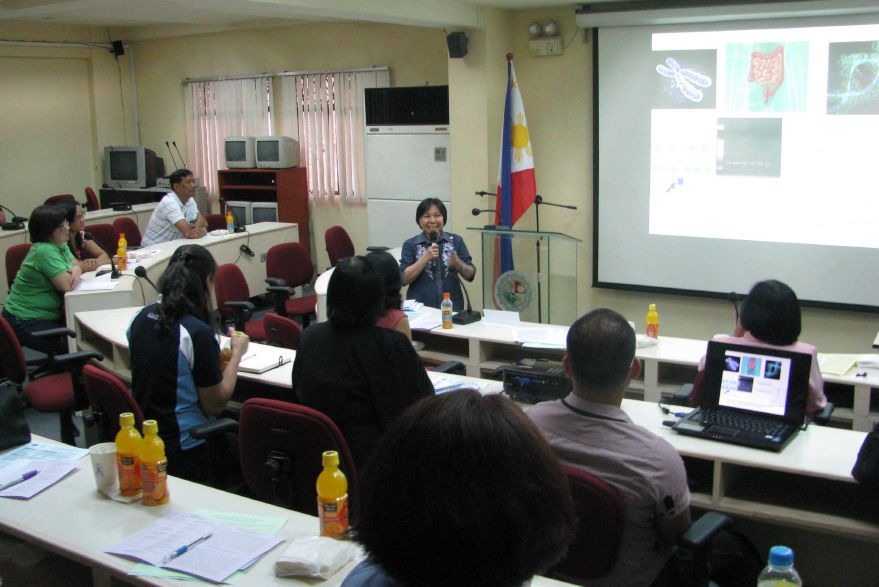Laoag City, Ilocos Norte - Among 18 entries for the research poster exhibit Saint Mary's University of Bayombong, Nueva Vizcaya bagged 1st place during the 1st Biennial Health Research Symposium held at Fort Ilocandia Resort Hotel, Laoag City, Ilocos Norte on June 26-27, 2014.
The study entitled "Antioxidant Screening of Selected Macrofungi from Mt. Palali, Nueva Vizcaya, Philippines" led by Marlon Saludarez & his teammates grabbed the attention of the judges due to its unique presentation & understandability of the research poster.
Second place went to Cagayan State University, through Prof. Andy Catulin of Carig campus. The board of judges expressed appreciation on the study entitled "Antibacterial Assay of Selected Microalgae Ethanolic Extracts Against Fish Pathogens" of CSU.
Third place went to Jocris Cabagun & teammates with Prof. Ramelo Ramirez with the study "Hepatoprotective Effect of Watermelon (Citrillus Vulgaris) on CC14-Induced Hepatic Injury in Albino Rats."
Certificates & cash prizes were awarded to the winners. For the first prize - P4,000.00, 2nd prize - P3,000.00, 3rd prize - P2,000.00 respectively.
On the whole, the success of the activity is attributed to the support of the Department of Science & Technology Regional Office 02 & the Cagayan Valley Health Research & Development Consortium.
THE GLOBAL call for ethical research has never been stronger, and three professional researchers based in the Cagayan Valley Region made sure to throw in their support in a Tagaytay City conference on Nov. 23-26.
Members of the Cagayan Valley Health Research and Development Consortium (CVHDRC) checked in at Taal Vista Hotel for theForum for Ethical Review Committees in Asia and the Western Pacific’s (FERCAP) 14th International Conference, an annual gathering on the dos and donts in health research.
“During the past decade, there has been a growing awareness about the importance of research ethicsamong various research sectors including sponsors, investigators, academic institutions and medicalspecialty associations,”the event’s introductory notes said.
It added: “There is increasing evidence that ethics in research is becoming institutionalizedin many Asian countries as shown by the increasing number of ethics research guidelines, accredited/recognized institutional review boards and the number of training programs in good clinical practice andresearch ethics.”
FERCAP was conceived in Thailand back in 2000 by bioethicists and medical experts to establish guidelines for thereview of behavioral and biomedical researches in the region.
The Department of Science and Technology’s Victoria B. Mabborang, Senior Research Specialist; Dr. Julius T. Capili, Dean of the Cagayan State University’s College of Allied Health Sciences; and Dr. Josephine Joy D. Lorica, faculty member of the St. Paul University of the Philippines’ Graduate School of Nursing represented the consortium,established in 2005 as a network of government agencies, state universities and colleges, and private institutionsengaged in research.
They joined a host of participants from all over Asia and the Western Pacific optimistic about an international linkage to enforce well-integrated and harmonized regulations on the treatment of human participants in research practices.
Nationalhealth authorities, ethics committees, researchers, academic institutions, pharmaceutical industry representatives and evenresearch participants shared their thoughts and stirred the discussions during breakout and plenary sessions, reportings and panel presentations.
Topics ranged from the ethical issues in research grants policy to gray areas inthe management and implementation of interdisciplinary researches. The researchers also discussed minimizing and possibly eliminating unethical practices, and ways toimprove consent forms filled out by research subjects.
Themed “Embedding Ethics in National Health Research Systems,” the meeting also incorporated hands-on activities so the participants would end up scientificallycompetent, sufficientlyinformed and ethicallydriven when they head back to their communities.
Jointly observed with the first-ever national conference of the Philippine Health Research Ethics Board (PHREB), founded in 2003 as the country’s policy-making body in health research ethics, the convention also provided a platform for stakeholders in the local health sector to discuss hot-button issues still aligned with the treatment of human subjects.
The gathering was co-organized by PHREB and FERCAP, with the help of the Department of Science and Technology - Philippine Council for Health Research and Development, the Department of Health, the Commission on Higher Education and the University of the Philippines Manila-National Institutes of Health.
 The Zamboanga Consortium for Health Research (ZCHRD) is now accepting entries for the “1st Health Research Writeshop” exclusive for Region IX Researchers.
The Zamboanga Consortium for Health Research (ZCHRD) is now accepting entries for the “1st Health Research Writeshop” exclusive for Region IX Researchers.
